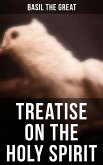In "On the Holy Spirit," Basil the Great presents a profound theological treatise that intricately explores the nature, role, and divinity of the Holy Spirit within the framework of Christian orthodoxy. Written in the 4th century, this seminal work offers a dialectical style that weaves together philosophical rigor and pastoral sensitivity. Basil skillfully engages with contemporary theological debates, drawing upon scriptural exegesis and the wisdom of early Church Fathers to articulate a robust doctrine that emphasizes the Holy Spirit's essential role in the Trinity and the life of the believer, thereby positioning this work as a pivotal contribution to the Nicene theology. Basil of Caesarea, a leading figure in early Christian thought and a prominent Bishop, was significantly influenced by the socio-political context of his time, including the Arian controversy that questioned the divinity of the Holy Spirit. His extensive ecclesiastical experience and commitment to the Nicene Creed empowered him to address these emergent theological challenges, ultimately shaping the understanding of the Holy Spirit as central to Christian doctrine and spiritual practice. "On the Holy Spirit" is recommended for anyone seeking to deepen their understanding of Trinitarian theology and the early Church's struggles. Basil's insights remain relevant, making this work essential for theologians, clergy, and lay readers alike who wish to explore the complexities of faith and spirituality in the Christian tradition.
Dieser Download kann aus rechtlichen Gründen nur mit Rechnungsadresse in A, B, BG, CY, CZ, D, DK, EW, E, FIN, F, GR, H, IRL, I, LT, L, LR, M, NL, PL, P, R, S, SLO, SK ausgeliefert werden.









